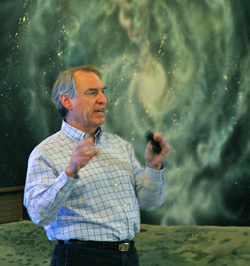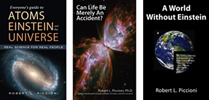|
U.S. to Ax Fusion &
Cut Planetary Science
|
April 10, 2012
SCIENCE magazine
and the LA Times report that the Obama administration’s 2013 budget
will slash domestic fusion energy research and will cut 20% from JPL’s
planetary science programs.
The U.S. Department of Energy (DOE) will instead help fund research at
ITER, a multi-national fusion program in France. Martin Greenwald of
MIT, chairman of the Fusion Energy Scientific Advisory Committee
(“FESAC”), said the administration’s plan amounted to “building a piece
of equipment for other people to use.”
Fusion is the holy grail of advanced energy research. It holds the
promise of producing energy as nature does in stars — 40 million times
more efficiently than burning coal, and with no chemical pollution, no
greenhouse gases, and no radioactive waste. Every advanced country in
the world is actively pursuing fusion energy, except it seems the U.S.
SCIENCE said
William Brinkman, director of DOE’s Office of Science asked FESAC to
consider sending U.S. scientists and students to China and South Korea,
because those countries have built new fusion facilities.
SCIENCE said the
administration’s plan “exports the country’s most valuable resource:
knowledge.”
The cuts will virtually eliminate the U.S. as a serious contender in
fusion research. The most advanced U.S. facility, the C-Mod at MIT,
will be shut down, with the loss of 130 research scientists and
graduate students. Its director expressed shock: “I didn’t have the
vaguest idea of what was coming.” The program at Princeton will lose
100 researchers and its machine will be inoperative until at least 2015.
The only remaining U.S. fusion program, the DIII-D at General Atomics
in San Diego, will lose 30 jobs and machine operation will be cut to 10
weeks per year. Tony Taylor, the VP in charge, says: “It makes no sense
to ship our intellectual capital overseas and make ourselves less
competitive.”
The $300 million
cut at NASA/Caltech’s Jet Propulsion Laboratory (JPL) — undoubtedly the
world leader in space research — will cost “hundreds of jobs.”
Scientist Jim Bell said: “It is nothing less than a shocking set of
cuts.” JPL has already been forced to cancel space research projects,
including a mission to bring Martian soil samples back to Earth and a
mission to Europa, Jupiter’s ice-covered moon. While the
administration’s currently stated goal for NASA is sending astronauts
to Mars within 20 years, one JPL official expressed skepticism since we
can’t seem to afford to bring back even one rock.
For most of the last century, the U.S. was the unquestioned world
leader in most fields of science. Our scientific leadership drove a
broad spectrum of economic advances, and ensured that our military
could defend our freedom from any threat. Bright young scientists came
to America to study, to innovate, and to strengthen our nation. Now,
our government is conceding leadership in several frontier sciences and
suggests we send our brightest students and scientists to Europe and
Asia, where there are nations eager to become the new centers of
science excellence. The plan seems to be to reverse the “brain drain”
that frustrated many foreign nations in the past.
By eliminating U.S. fusion research and cutting JPL, DOE will save
about $350 million, slightly more than half of what they squandered on
Solyendra, the now-bankrupt solar panel company.
In his 2011 State of the Union address, President Obama proclaimed the
U.S. faces a “Sputnik Moment”, when we must commit to greater
investments in science and advanced technologies to ensure America’s
future as a world leader. Yet his administration has shut down the
Stanford Linear Accelerator, the Fermi National Accelerator,
manned-space flights, domestic fusion research, and will substantially
reduce our leading space science program.
If we eliminate U.S. jobs in the advanced sciences, how many of our
bright minds will return after being sent to train abroad?
Extremely depressing.
Best Regards,
Robert
* * * * * * * * *
* * * * * * * * * * * * * * * * * * * * * * * * * * *
* * * * * * * * * * * * * * * *

Dr Robert
Piccioni,
Author of "Everyone's
Guide to Atoms, Einstein, and the Universe",
Can Life Be
Merely An Accident?"
and "A
World Without Einstein"

|
|